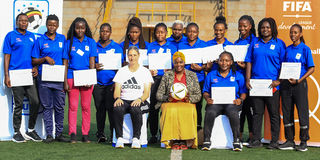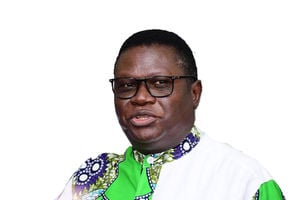Prime
Women football stakeholders receive development projects with open arms

Caf B diploma graduates pose for a photo. PHOTO/COURTSEY
What you need to know:
Fufa president Moses Magogo would later explain that he withdrew the team to get back on the proverbial drawing board and create structures that would mean Uganda could present a team every time the qualifiers happen.
The rapid growth of women’s football in Uganda has been aided by meticulous planning by the governing body Fufa.
When Fufa took what seemed a radical decision in 2013 to pull out the youth team from the Fifa U-20 Women World Cup Qualifiers, you would be hard placed to believe that in less than a decade, Uganda would become a regular in all available women’s football competitions or at least their qualifiers.
Fufa president Moses Magogo would later explain that he withdrew the team to get back on the proverbial drawing board and create structures that would mean Uganda could present a team every time the qualifiers happen.
The solution was to start a league with schools as the bedrock. That is how the Fufa Women Elite League (FWEL) was born. At the time, Fifa instructor on marketing and communication Emy Casaletti and Namibia coach Jacqui Shipanga visited Uganda to launch the Fifa 'Live Your Goals' project in 2014.
After five years, the mass participation had led to a growth in the number of teams. But the continental body, Caf, was planning to start a new Champions League for women. That prompted Fufa to organize a symposium that came up with the idea to start a new top tier league.
The teams in the FWEL after the 2018/19 season were split into two with the top 10 promoted to the inaugural Fufa Women Super League (FWSL).
With the leagues set and the clubs growing by the day, Fufa realized towards the end of 2021 that the quality of football was not growing at the same rate as the numbers involved. This can perhaps be seen in the topflight league, where only three sides can be said to be really competitive or in the performance of the national teams during decisive games and the clubs that try to qualify for the Champions League.
Since the 2019 Women's World Cup in Canada, Fifa intensified its support towards women's football by opening up programs to all 211 member associations. These, however, had to apply for them and Uganda sought help in capacity building courses for coaches, referees, goalkeeping and fitness coaches, plus club administrators among others.
Capacity building
So in April 2022, Zimbabwean expert Violet Jubane graced the launch of the $50,000 (about Shs180m) per year Fifa League Development project – aimed at the development of every aspect of the league. Fufa’s development officer Joan Namusisi is the project coordinator.
Last year, Fufa trained; 38 girls in the beginners’ refereeing course (15-20 years), 14 women in the Caf C and D courses for (FWEL and FWSL) coaches and senior players, 10 women in the general coordinators course, 11 in marketing and communications, five in the Level One goalkeeping coaching course for coaches in FWSL, FWEL and regional league, plus two fitness trainers
This year, another 38 participants across the eight regions of Fufa have done the refereeing course while eight of the 17 coaches doing the ongoing Caf B Coaching Diploma Course targeting coaches in the FWSL are women.
Fufa, in conjunction with the Uganda Women Football Association (UWFA), also fully facilitated the 10 (three women) FWSL Club CEOs to the Football Administration and Management Course Level two (Famaco II) while there was recently concluded Fifa Coaches Workshop at the Fufa Technical Centre, Njeru that was facilitated by Bernard Anouschka and it attracted 38 participants, 13 of whom are women. Fufa had for 10 years just run the Famaco I.
Taking the opportunities
“We organised this course to enable people to change their mindset because they have been thinking negatively,” UWFA chairperson Margaret Kubingi said.
“For us, this is a way of creating awareness in the game. Women Football is under developed and we need more people with knowledge guiding the grassroot project,” she added.
For some footballers like Wakiso Hill’s Phoebe Banura, who did the management course, and her former teammate at She Corporate Anitah Arinda, who did the Caf D course, the studies are also about preparing for the future after football.
“As girls, we play football but we can’t play it for too long. The course has been so good and I believe it will be a good cornerstone to usher me into sports administration after my playing career,” Banura said.
Hamza Waiswa, the public relations officer of Kampala Queens, believes he sees short term benefits in terms of change in the behaviour of some players like Daisy Nakaziro.
“She handles herself differently because she now has the experience and knowledge of how a player with big ambitions should behave.
Faridah Nassazi of Police Queens was a secretary of the club but she is now the manager – a better paying role in the club,” Waiswa said.
For women football journalist Shafic Mutebi, the opportunities that just the availability of the courses have presented are invaluable.
“Some of these courses cost Shs2.5m but the participants get to do them for free. In the end, they get the knowledge to develop players, their teams and the game.
When the league had just started in 2015, Ayub (Khalifa of Kawempe Muslim) and (his assistant Moses) Nkata were the best ranked coaches and it is no surprise they won back to back trophies.
But when other coaches like (Christian) Magoba, Rajab (Buyinza) and others polished their knowledge, they were able to challenge and also win trophies. So, hopefully these mass courses will bring quality players and coaches right from the grassroots,” Mutebi said.
For Ali Mwebe, the director of football development at Fufa, the fortune of these courses that are married to Fufa’s technical master plan is in the follow-up.
“But we handled that (the follow-up) from the start. First, we did not invite individuals on our own or openly but we asked the clubs to send the people they believe need the knowledge and will help them improve.
Also for the recently concluded refresher course in Njeru, the coaches were taught based on our game. The instructor asked for videos involving local games and we provided them,” Mwebe added.
However, some challenges abound and could form the basis for the coaches that are taught next year.
The challenges
According to a report made by Namusisi, there are still challenges in the medical departments of clubs and with maintenance of pitches that should actually produce the good players.
Most teams do not have trained medical personnel to handle players hence posing a great threat to the players’ lives. The teams lack medical equipment as basic as medical bags, ice boxes, stretchers among others.
Also, some teams still have poor pitches which get waterlogged due to poor drainage systems and poor management especially during the rainy seasons causing delayed kick-off of live television games and postponement of matches,” part of Namusisi’s report reads.
Next year, Fufa hopes to distribute the aforementioned medical equipment to FWSL clubs and also add computers and routers to support club and player registration and the competition management system.
They also want to organise a groundsman training for the FWSL and FWEL clubs to improve pitch management then also organize a refresher course in fitness for the trainers of the clubs in both tiers.
Nearly ten years after making the decision to take women’s football to the communities, there is a realization that producing a quality and competitive player will take a holistic approach. Magogo’s Fufa are now taking advantage of Fifa’s support towards initiatives to improve the human resource that takes care of the players.
Courses done
Coaching; Caf B, C and D
Refereeing
Management and administration
Goalkeeping
Fitness
Marketing and communication
Courses needed
Medical
Technology
Fitness refresher
Pitch management




